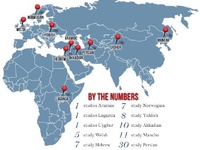Obscure languages offered at Harvard face challenges when trying to attract students. Those languages like Spanish and Chinese that garner the largest enrollments are spoken around the world and can add critical skills to a resume.
Even so, those involved in Harvard’s uncommon language programs maintain that the courses are worth preserving.
“The number of speakers of a language does not determine how important a language is,” says Feehly.
Students and professors say they often face questions about why they devote time to learning something many may consider impractical.
Elliott says the language he teaches derives its academic value from its historical applications.
One out of every five documents from the Qing Dynasty, of which Manchu is an endangered primary language, is written in the language, according to Elliott. Because of his knowledge of Manchu, a language known by very few people, Elliott was able to investigate documents that had never been read before.
Students choose to take uncommon languages for a variety of reasons. Elena F. Hoffenberg ’16 says she was drawn to the study of Yiddish for personal reasons. “On a very personal level it’s a way for me to connect with my predecessors,” she says. The five students enrolled in McKenna’s Welsh class chose the language in order to pursue everything from thesis work to “ something interesting and off-beat,” says McKenna.
For Elliott, the University is a prime location for exploring obscure languages.
“Harvard is the kind of place where people need to be able to pursue esoteric subjects,” he says. “The world looks to Harvard to provide instruction in exactly those kinds of areas—that is one of the beautiful things about Harvard.”
—Staff writer Neha Dalal can be reached at nehadalal@college.harvard.edu, Follow her on Twitter at @theneha.
—Staff writer Indrani G. Das can be reached at idas@college.harvard.edu, Follow her on Twitter at @IndraniGDas.









